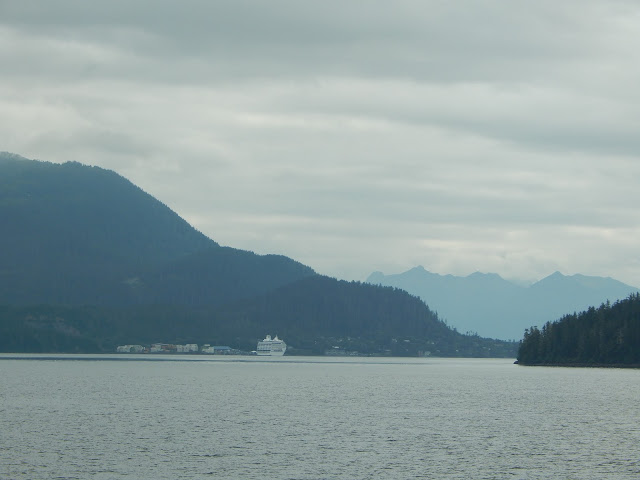 |
| Brown bear at Fortress of the Bear |
I like vacation. You
wake up in a beautiful place, you sort of know what direction you are headed
but you have time to be distracted by anything else that presents itself. You can stop to see the view, or you can keep
going. You can go out to the bear rehab
center, or you can go to the Sitka
National Historic
Park Sitka , Alaska
We got there from Juneau by way of a four and a half hour trip on the Alaska Ferry. An hour after we got off the
ferry, we walked along the ocean front from downtown Sitka, trying to figure out why we kept seeing fish leaping out of the ocean. A local man explained that these pink salmon were trying to loosen up their eggs in preparation for spawning at the fish hatchery. Plop, splash, went another pink salmon throwing itself up in the air.
The trail led to a path through the woods. The quiet closed-canopy forest with large Sitka spruce and Western hemlock trees was soothing. Eighteen Tlingit and Haida totem poles and house posts were spaced along our walk. During the ferry ride, Winnie had been cooped up in the RV (not exactly cooped since the RV is spacious), so we all enjoyed stretching our legs. Lynne and I learned about the Tlingit and Haida cultures while we were at it.
The trail led to a path through the woods. The quiet closed-canopy forest with large Sitka spruce and Western hemlock trees was soothing. Eighteen Tlingit and Haida totem poles and house posts were spaced along our walk. During the ferry ride, Winnie had been cooped up in the RV (not exactly cooped since the RV is spacious), so we all enjoyed stretching our legs. Lynne and I learned about the Tlingit and Haida cultures while we were at it.
We did a bit more wandering
that afternoon. We actually went to part of a Russian Orthodox vesper service
on Saturday night. The Russian Orthodox church was
resplendent with gold, lots of precious chandeliers, iconic paintings and an
aging bearded priest in a long flowing gold robe. The service was intoned (chanted), in a style
that I had heard before in the Episcopal church, and highly stylized. The words
being chanted were read out of a printed liturgy. I enjoyed the visual richness, and I was
interested to see threads of commonality with Episcopalian ritual. We didn’t
stay for the whole service, but I was glad to get a glimpse of this remnant
from the time when Russian people occupied Sitka
More to my taste was Fortress of the Bear, a cleverly
named facility at the east end of the fourteen miles of paved road in Sitka. Fortress of the Bear re-purposes
several huge old waste water treatment cisterns to provide sheltered spaces for
orphaned bears: six brown bears (aka grizzlies) and three black bears from three different
sibling groups. They all have been given human names, so you have this feeling
of being close to wild animals while simultaneously feeling like you are watching your
pets play. The bears have ponds, toys to
float around with, multiple spaces to go into and camaraderie. The black bears (in a separate enclosure from
the brown bears) have the stump of a tree to climb up. People have constructed
platforms above the bears, so we of the two legged species can safely observe
examples of four legged creatures that are bigger than we are. Like you, I am sure, I would prefer to
spontaneously see bears in their natural habitat, but since bears, and most
wildlife, run away from people when they can, the chances of seeing bears
playing, eating, swimming, and relaxing in broad daylight like this are
slim-- except at Fortress of the Bear. The above pictures are brown bears, which is
what they call grizzly bears on the coast.
This next picture shows the
black bears. Watching the black bears
gracefully climb up the stump and stand on their two hind feet made a big
impression on us. Don’t try to get away
from a black bear by climbing up a tree.
 |
| Three brother black bears at Fortress of the Bear |
One of the other choices we
had in Sitka was where to camp, and even though we had reserved a site in the
wooded Starragavin
campground, we ended up staying at the Sitka
municipal RV park, right on the waterfront, with this lovely view out the
window. I enjoyed watching the boats
leaving the marina and returning from the day on open water.
 |
| The view from our RV |
And here are some houses
built on small rocky bases out in the water.
 |
| Looks like a boat is the only option for leaving this house |
My biggest impression of Sitka Baranoff
Island Juneau Sitka Sitka Starragavin Park at the other, the museum at Sitka National
Historic Park Sitka
Up next: 36 hours on the Alaska Ferry from Sitka to Prince Rupert, BC.
Up next: 36 hours on the Alaska Ferry from Sitka to Prince Rupert, BC.
 |
| View from the ferry as we approached Sitka |


I hope you do not mind me saying this. Wow you take some wonderful cheerful photos. Thanks again for sharing your life journey with all of us.
ReplyDelete